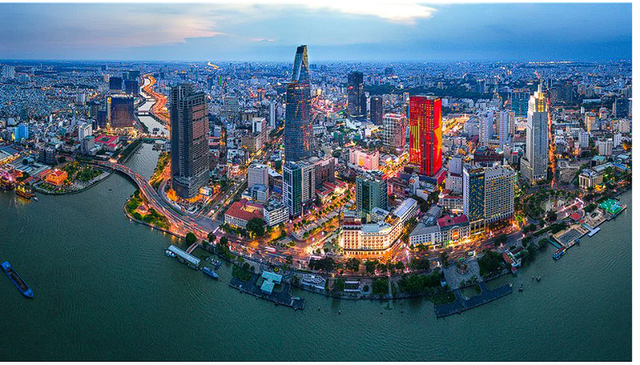Ho Chi Minh City targets to raise GPD per capita to US$15,000 by 2030
VGP - Ho Chi Minh City, the leading economic engine of Viet Nam, targets to raise its GDP per capita to US$14,800-15,400 by the end of this decade, according to a Master Plan approved recently by the Prime Minister.

The southern city expects to become a locomotive of green economy, digital economy, digital society; and an economic, financial, trade-service, cultural, educational, scientific-technological hub of the country.
It targets to deeply integrate into the global community, hold a prominent position in the Southeast Asian region, with its economic growth rate and GRDP per capita among the top in the country, surpassing the high-income threshold; and be a city with a high quality of life, a rich identity, sustainable environment, and strong adaption to climate change.
Ho Chi Minh City will have 16 central districts, divided into 4 sub-regions, of which sub-region 1 is District 1; sub-region 2 covers districts 3, 4, 5, 6, 10, 11, and Phu Nhuan; sub-region 3 includes 7, 8, Go Vap, Binh Thanh, Tan Binh, and Tan Phu; and sub-region 4 encompasses district 12 and Binh Tan district.
Economic and social targets
The southern city eyes an average GRDP growth rate of 8.5 – 9.0 percent annually within the ten-year period.
By 2030, its per capita GRDP is projected to reach VND 385 million – 405 million, equivalent to US$14,800 – 15,400.
The service sector is expected to account for above 60 percent of GRDP, followed by the industrial and construction sector around 27 percent (with manufacturing contributing 22 percent), and agro-forestry-fisheries at 0.4 percent. The digital economy, meanwhile, is expected to make up over 40 percent of GRDP.
The metropolis' population is estimated to reach 11 million by 2030 and 14.5 million by 2050.
Labor productivity is expected to grow 7 percent annually, with its human development index (HDI) exceeding 0.85. Urbanization is set to reach 90 percent by 2030 while poverty will fall to below 0.5 percent.
The city will strive to become a leading e-commerce hub in the southeastern region; develop agriculture sector, focusing on high-tech, eco-friendly, and organic practices; develop key industries such as chip and semiconductor manufacturing, renewable energy, precision engineering, and food and beverage processing./.
